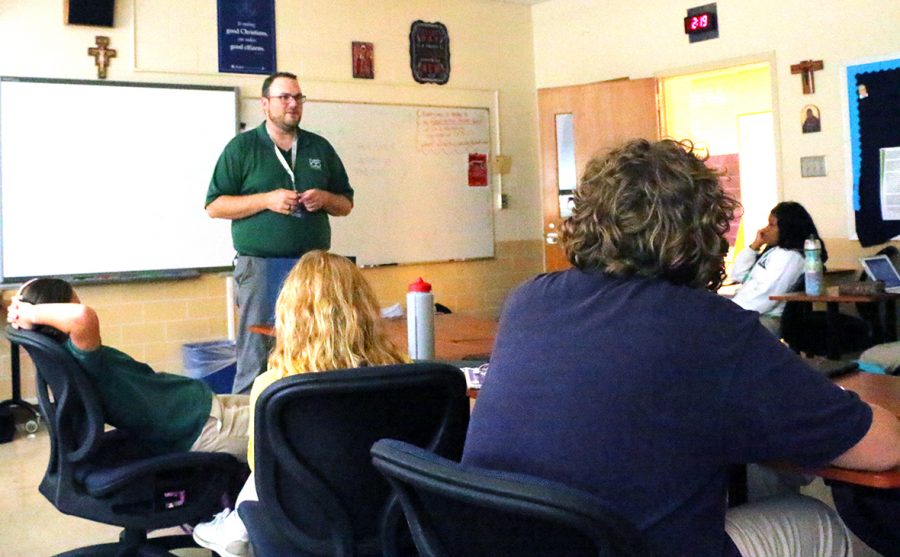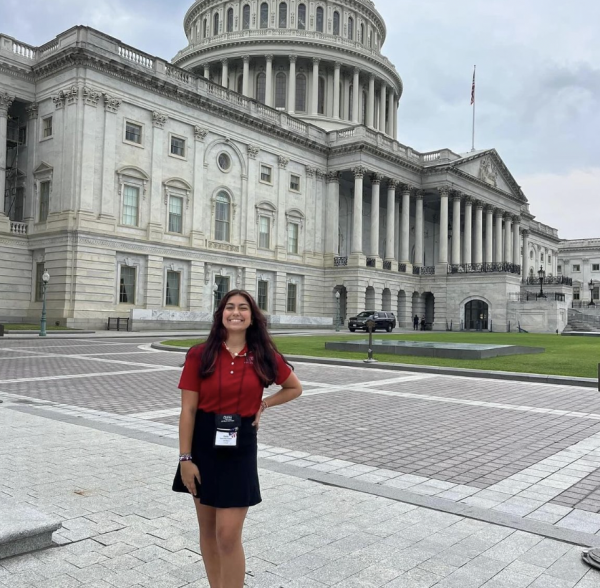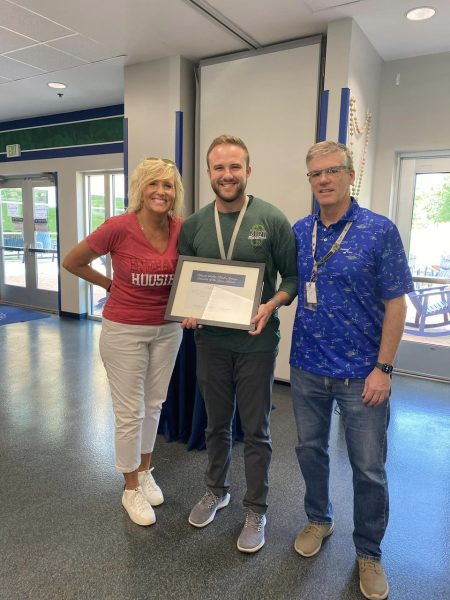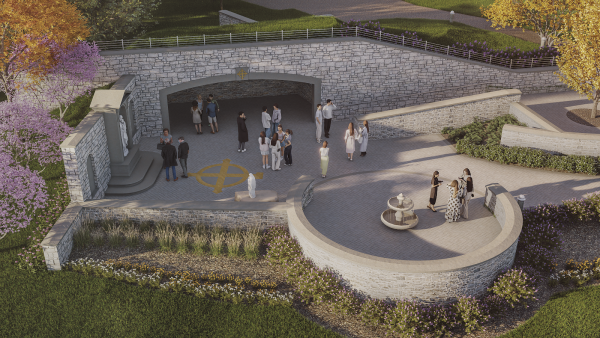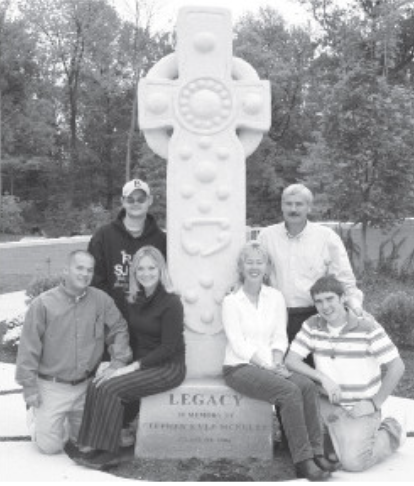Teacher reflects on recent events in the Church
Catholics should keep the faith, Cannaday says
Theology teacher Mr. Matt Cannaday leads a discussion in a religion class.
The following is an edited transcript of a Q and A by co-editor in chief Madi Tran with theology teacher Mr. Matt Cannaday.
What was the situation that happened in Pennsylvania?
I think its important to note that this is different from the story in Boston that broke. The one in Boston was done by the good work of journalists (and they) got to the core of it.
There wasn’t much governmental action done in (Boston). It was mostly the public perceptions it. Pennsylvania was different because it was actually a grand jury, so the government got involved and they investigated several dioceses in Pennsylvania over the course of X amount of decades.
In that (the authorities) discovered that there were rampant cases of not only priests abusing minors, but the bishops not doing anything about it.
In fact the bishops who did know about it would just move these priests to different dioceses. It was bishops in a sense covering their own hides. (They would move) known perpetrators to different parishes. The government now being involved can impose certain penalties on people that are juridical rather than ecclesiastic or church issued.
What has the Church said about the situation?
(The Church) has said a number of different things. Almost every bishop has expressed sorrow for it. Honestly, that’s not enough. What the United States Conference of Catholic Bishops is doing is revising their entire method of dealing with sexual abuse.
In 2003, they put out a charter, the Dallas Charter, (which stated) how the church should deal with sexual abuse issues and now the church is basically saying the bishop should not be involved in this and all of these accusations should be investigated by lay people and civil authorities.
So what the Church is responding with now is with shame, apology and talk of reform. We haven’t seen a reform happen yet. To make it clear it’s just talk right now and the involvement of lay people is going to be paramount in the future of this issue.
What course of action do you think the Church should take to ensure this situation never happens again?
The Church should empower laypeople to have clear roles of leadership in the church.
When it comes to sexual abuse the bishops should remove themselves from the situation because of conflict of interest.
It should be laypeople and civil authorities who should investigate the claims. If a claim is found to be credible, then the Church needs to make a swift decision on behalf of the person who the claim is made against and then immediately turn it over to civil authorities for civil action to take place.
Outside of just the legal (proceedings), what we need to do as a church is encounter the people who have been victimized by this. Pope Francis has talked a lot about this culture of encounter in the church and how we need to be a field hospital, because right now it’s self-inflicted wounds and we need to be there to carry our people off and work with healing them. Really it’s the Church that’s harming itself.
It makes life for most of us laypeople (difficult), because it’s our leaders who we can’t trust in a very small number of certain cases. We still have to remain hopeful that Jesus is active in this and that the Holy Spirit is moving us toward the Father. The Number-1 key is to remain hopeful, but also know that the Spirit changes things and (we have to be) hopeful that the Spirit is changing things.
Do you think the Church is doing enough to prevent this from happening?
I don’t think so, but I’m hopeful that the Church is going to be doing things (to better this situation). If you’d asked me a year ago I would’ve said no. As of right now, baby steps, I’ll say, are happening. Dioceses are releasing lists of priests who have been credibly accused.
Why were some of these cases covered up?
Ego, pride, careerism. In a lot of cases, it was so bishops themselves didn’t feel implicated. They wanted to remain empowered basically. They didn’t want to be addressed as being part of the scandal. They wanted to keep things internal, because ultimately they didn’t want the press getting a hold of it. They also kept it quiet so the bishops could move up.
To give a different perspective as well, a lot of these bishops were close friends with these priests who were credibly accused. In some cases they didn’t want to implicate their best friend. On a lesser scale, it does not excuse it, but how often do we not snitch on people? It’s that same mentality. We talk about standing for justice but then we don’t do it. It’s human fragility and it’s also ego and pride.
Has this incident affected your faith or views on the Catholic Church?
No, given that I understand the Church to have different roles, but all the roles are equal in bringing about the communion of God. I have no intention of turning on Jesus. I know it’s a crude way of thinking of it, but I’m not going to leave Jesus because of Judas.
We are human beings and (the Church) is a human run institution. There are going to be scandals. There have been scandals for 2,000 years. We’re still standing and ultimately the sacramental life of the Church allows me to serve people and to serve the Body of Christ. I have no intention of leaving (the Church), but what (the scandal) has done is made me more vocal. It made me recognize that I am a more important member of the Church.
What was your reaction when the news first broke?
“Here we go again,” that was my reaction. I actually heard about it before it hit the media just because I pay attention to Catholic news. We kind of knew this was coming. We didn’t know how bad it was going to get. This has happened twice before, so it’s not
like this is a new revelation.
I have family in Ireland and if we were to look at the Irish Church, it’s worse than here. It’s not an American problem, it has happened across the Church. For me it was not all surprising, but it was another thing where we have to make it better. We have to listen to the Spirit and stop worrying about ourselves.
What should be done so that the victims receive peace and compensation?
The compensation is easy, the peace is not so easy. We have to be willing to accept our role in this. We can’t put on the facade of the Church that is perfect. We can’t put on the facade of this perfect society. We have to say no, we’re broken and we messed up. We have to fight for these people.
That’s not just us thinking of the Church as bishops and priests. They have very active roles, but it’s also us laypeople fighting for the victims and trying to hold the people who perpetrated this violence accountable.
It’s us raising our voices and welcoming these people in and showing them as a Church and not just Rome. We as Church are not just the bishop. That makes up part of who we are. We as church are ultimately the Body of Christ and the people of God.
It’s our duty and our toll to ache for these members and to heal them as well. That’s the best we can do for the peace element. For the financial bit, we have no problem with compensation, but the peace should be more concerning to us.
What should the church do in order for these types of people to never become priests in the first place?
If we look at the cases, most of those happened a long time ago. Those happened during a time where they’re was less intentionality around psychological development. To give you an idea when I applied for seminary in January of 2015, I had to pass three separate psychological evaluations. I had to take a personality test that was about 400 questions and then sit down with a psychiatrist after that to evaluate those results and then do other tests with him. I then had a separate meeting with a psychologist for him to assess me and that was just to apply for seminary.
We do have much better psychological practices in place. Every seminarian has to meet with a psychiatrist. They have a psychiatrist for every seminary in the country. Seminarians have to meet with him or her, they have to just to make sure they have psychological well being.
If they don’t then that gives (the seminarian) something to work on and if it continues to become a problem then they will be asked to leave seminary.
Nowadays we do have (psychological evaluations) in place, but sometimes, in very rare occurrences, there are such strong personality disorders that even the best psychiatry can’t see through it.
It’s not a perfect system, but it’s the best we have in psychology and brain development today.
Why did some victims wait to report these cases?
Fear would be my guess. It’s similar to domestic abuse where the person who is doing the abusing has power and they utilize that power as a measure to shut the victim up. You tell me, if you’re 10 years old and you’re abused by a priest and if the priest says, “Don’t tell anybody or you’re going to hell,” that’s going to irreparably change the way that you think and the way that your mind is going process certain things sexually.
That’s why a lot of the people who come out come out so much later on. It changes the chemistry of the brain in such an irreparable way.
Do you think dioceses in different states or even countries should look into possible coverups?
Absolutely. I think it’s necessary at this point that the entire church do it. We’re only hearing about America because I think that our media thinks that we’re the only country that exists or is important.
There are scandals in Australia, Ireland, England, Spain, Italy, France, India, the Philippines, China, etc. It’s not just an American problem. Every bishop’s conference in the world needs to look at this and do a thorough investigation led by lay people.
This summer, every bishop in the country of Chile resigned at once. They all offered their resignation letter to Pope Francis. because of how out of control their abuse
How has the situation affected Cathedral and the entire Catholic Community?
I’m not sure it’s necessarily affected Cathedral yet. I was very open and I brought it up in class.
Many kids don’t even read the news, and so when I introduced them (to the situation), what did hit several kids was that there was a priest who was accused locally. He (celebrated) Masses all over the city and (kids) knew him. Now they immediately jumped to thinking he’s a child abuser. Well, he’s been accused so we have to allow this process to pan out.
If he’s credibly accused then there will be a number of kids here who will never think of him in the same way. That falls on us as theology teachers to let them know what the Church really is.
As it relates to the community at large, all you have to do is look at the empty pews. That’s not the entire reason why churches are emptying out, there’s a lot of different reasons.
There’s a lot of people who feel betrayed by this, and I think we as a church are in the position to bring God’s message of faith, love and hope to the world and instead we have abused children.
How we get the young people in the Church to be aware of the situation and to care about it?
I think right now there’s a propensity in the current generation to ignore the bad things and only look at like funny Vines and memes, without processing that there are things going on that we need to change in the world.
With these things that we need to change, we need that voice. We need young people as well. What I can do continue to be open and transparent and also show that living the lifestyle of a Catholic Christian is a beautiful and joyful way of living life. I have to show that. Not just teach it, but live it. I think if more of us lived and are openly living what it means to be Catholic, more people would be attracted to it.
How do you think the Church should regain people’s trust?
(The Church should) be transparent, allow lay people to be more visible leaders. If you look at the Church, so much of the leadership structure is the clergy and I have no problems with the clergy being in positions of leadership, but when it’s only clergy it’s not a fair representation of the Church as a whole.
We are familiar and we are educated in what the Church teaches and how the Church runs.
Lay people can be in those positions, too. (I’m) not saying as bishops or as priests, but in positions within the Church, such as the Curia in Rome helping to make decisions. Vatican II actually said that laypeople need to be in these leadership positions.


